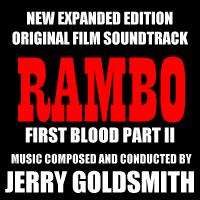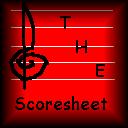
Before he did The Mummy, before he did Total Recall, and before he did
Star Trek V, Jerry Goldsmith composed Rambo: First Blood Part II, which
many fans consider his best action score. Although I don't hold it
in quite as high esteem, it is still one of his better works, and possibly
one of the best action scores he's ever composed. Before I go any
further, let me say that I haven't actually heard his score for the original
First Blood, so some of my discussions on the themes may be somewhat, um,
WRONG. There are about 3 principal themes present. The first
is a new Rambo fanfare, which is quite exciting and perfect for the movie.
After that is the "Long Road" theme from First Blood, which is now quite
subdued, usually played on strings or woodwinds. Finally, and this
doesn't appear very often, there is a fun quasi-Oriental theme played on
weird synths to convey the setting. Although there's a heavy dose
of orchestral action in this score, Goldsmith also frequently uses quiet,
wistful cues based on the Long Road theme, as well as less interesting,
orchestrally dissonant tracks to raise tension. One of the only things
that I don't like about this score is the composer's obsession with annoying
synthesizers. Frankly, they are usually distracting and the score
would have been a lot better with some kind of orchestral accompaniment
in their place. The release I'm listening to is a new 1999 reissue
of the original soundtrack by Silva Screen, complete with about 15 minutes
of new music. Now, there wasn't really anything wrong with the original
45 minute Varese Sarabande CD, except it was virtually impossible to find.
However, I'm still quite happy to be able to hear the new music, and the
album contains virtually the entire score. The only thing that seems
to be missing are the end credits that Goldsmith composed, which were replaced
in the film by a horrid rock song (present on this disc). The official
story I heard is that the credits were not on the original session masters,
and no one could find them. Silva's new release contains some astounding
liner notes, with sections on the movie and score as a whole, a track-by-track
breakdown, as well as a short note on sound quality, which states basically
that some small imperfections are present, none of which I can hear.
In fact, the sound here is even better than some modern recordings, with
stereo seperation so good that I sometimes have to check one of my speakers
to see if it's still working during the quieter moments with instruments
only on one side playing.
Track by Track
1. Main Title (2:12)
Goldsmith's rousing main title introduces his
new Rambo II brass fanfare. After a short, building string introduction,
Goldsmith throws at us the most horrid, distracting synth effect I've ever
heard. It's almost like some kind of mutated electric guitar.
Anyway, the trusty Long Road theme is introduced under this, and the music
finally segues into the introduction of his Chinese theme, which doesn't
appear very often in the score. One of the subtleties that I love
is the fact that he waits until the very end of the cue to play the fanfare
theme by itself, unlike most composers would do. Instead, he interpolates
tiny snippets of it between the synth Oriental theme, with each segment
becoming louder and more pronounced, finally climaxing in a giant military
march in which the whole theme is given to us.
2. The Map (1:07)
This short cue is a tension-building suspense
cue utilizing mostly electronics (including the fake guitar sound that
I hate so much.) About halfway through, he starts to interpolate
the First Blood theme.
3. Preparations (1:16)
More grating synths open this transitory track,
which later becomes founded upon a racing low string ostinato as well as
the First Blood theme. In the last 20 seconds, the new Rambo fanfare
becomes the main attraction.
4. The Jump (3:18)
Both the Chinese theme and the Rambo fanfare
form the basis for this track, with the First Blood motif thrown in at
various intervals. I've begun to decide that this new fanfare is
one of the best action motives Goldsmith has ever conceived. This
pulse-pounding cue picks up momentum throughout its entire running time,
and it's one of the better cues on the album. Thankfully, the synths
are left behind until the very end.
5. The Snake (1:48)
After an awesome opening action march based around
the fanfare exclusively, the music becomes more like the tension-building
cue heard in track 2, with a hissing synthesizer used to represent the
snake onscreen. After the opening action cue, the First Blood theme
becomes the main attraction, although it's not used very much.
6. The Pirates (1:27)
Atmospheric synthesizer effects form the bulk
of this cue. One of the building synth motives heard earlier, as
well as hints of the First Blood theme, make themselves known periodically.
7. Stories (3:26)
In the first seconds of this cue, the Oriental
synth motif becomes the centerpiece, only to later be taken over by the
new Rambo fanfare in the strings. The remainder of the cue is a romantic
piece based on a moving solo oboe presentation of the First Blood theme,
which has now become the love theme of the score. Strings form the
bulk of the accompaniment, and various short sections of both the Oriental
motif and the Rambo fanfare eventually enter the soundscape.
8. The Camp/Forced Entry (2:23)
One of the better previously unreleased tracks,
this action cue takes all three principal themes, as well as some of the
synth rhythms heard earlier, and forms an exciting, sometimes ambient listening
experience.
9. The Cage (3:55)
Innovatively, Goldsmith mixes 2 of the score's
main styles in the beginning of this cue - the First Blood theme played
on the Oriental synths. The track eventually becomes a tension-building
"snooping around" piece, always utilizing all three themes, including the
more tender First Blood love theme (heard earlier in "Stories") Also
returning is the bass synth ostinato, heard in almost every cue thus far.
10. River Crash/The Gunboat (3:30)
One of the better tracks present, this combines
all three themes much like the previous track, but here they're molded
into an exciting action cue. Although it has more synths, this score,
and particularly this track, reminds me of some of the action music in
Star Trek V. In fact, one of the fast descending woodwind action
motives, which is buried far in the background here, becomes one of the
principal action motives in Trek V. His use of the themes here is
also a lot like Trek.
11. Betrayed (4:22)
Another awesome action cue, based heavily
on the First Blood theme along with ethnic instrumentation. Even
moreso than the previous track, some of the string accompaniment would
be found in Goldsmith's later Star Trek V score. The composer breathes
new life into that wearing creeping synth ostinato by upping its tempo
and dynamics. Although it's not featured that much, the Rambo fanfare
is present as well.
12. Bring Him Up/The Eyes (2:04)
The first part of this tension cue is based on
the Chinese theme and Rambo fanfare, played in both strings and brass.
However, as the hero is thrown into a pit of leeches, Goldsmith employs
grating, harsh synthesizers to represent the carnivorous organisms.
13. Escape from Torture (3:39)
As the liner notes say, this is definitely one
of the main action highlights of the score, heavily featuring the 2 Rambo
heroic themes, as well as our favorite synth ostinato, now played on the
annoying fake guitar instrument. Also spotlighted is the snare drum,
which lends an appropriate military-esque march quality to the action.
The strings are usually used only as descants or ostinati, with the melody
exclusively for brass chorale, which especially exciting during full presentations
of the Rambo fanfare.
14. Ambush (2:45)
As Rambo's love interest perishes by a squadron
of bullets, Goldsmith personifies her death with a return of the solo-oboe
rendition of the First Blood theme, along with strings. However,
with the return of that annoying building synth ostinato, the music regains
its masculine characteristics with a martial horn solo. In the last
30 seconds is an ominous ethnically flavored version of both the First
Blood theme and Rambo fanfare.
15. Revenge (6:14)
The action centerpiece of the album, this intercuts
tension-building dissonant strings and ethnic instruments with martial
orchestral cadences based around the various themes. Unfortunately,
Goldsmith also uses all of his favorite annoying synthesizers, including
the creeping ostinato and fake guitar. However, they're not enough
to ruin the cue, which is one of the very best of the score.
16. Bowed Down (1:04)
This is a short action cue with a synth ostinato
in the bass, and various brassy incarnations of the First Blood theme in
the melody.
17. Pilot Over (1:52)
Another one of the best cues on the album, this
has some extremely complex brass writing outlining the First Blood theme.
Also noteworthy is the way that Goldsmith has finally almost let go of
the synths, although they do appear once or twice. Finally, at the
climax of the piece, we get an ecstatic action oriented playing of the
full Rambo fanfare.
18. Village Raid/Helicopter Fight (4:53)
Yet another virtuoso action cue, this is centered
around long percussion cadences and brass fanfares based on the First Blood
theme. This is definitely the best rendition of that theme I've ever
heard, especially toward the second half. Even the usually annoying
creeping synth ostinato becomes an exciting motif here. In the last
section, Goldsmith brings the Rambo fanfare to the forefront and interpolates
it with the First Blood theme. Even those who already have the older
Varese release of this album may want to look into this expanded edition,
mostly for this cue. I couldn't imagine hearing the album without
it.
19. Home Flight (3:01)
For the resolution of the film and score, Goldsmith
gives us one last exciting action set-piece based on the synth ostinato,
Rambo fanfare, and First Blood theme.
20. Day by Day (2:06)
Remarkably, Jerry Goldsmith doesn't end his giant
action score with a loud fanfare. Instead, we get this charming,
tender tone poem on the First Blood theme, which, surprisingly, is a great
ending to the score. Finally, in the last 10 seconds, the Rambo fanfare
is presented in the horns.
21. Peace in Our Life (3:18)
Do yourself a favor and turn the CD player off
before you get to this. Trust me. Although it's a song based
somewhat on the Rambo theme, I don't know any Goldsmith fan who would want
to have to sit through this to hear the short interpolation of it.
This is one of the quintessential Jerry Goldsmith
action scores that everyone needs to own. Frankly, I hadn't really
heard much about it until I got this release, and I now can't imagine my
collection without it. If you've heard some of Jerry's other big
action scores, particularly Star Trek V, you will almost definitely love
this one. Although some of the long stretches of tension music, as
well as the synths, can become a little wearing, fans of the composer and
action scores in general will definitely go for this. The reason
the orchestral performance rating is only a 6 is because of the annoying
synthesizers.
Rambo: The Final Score
| Music Rating |
9/10 |
|
|
| Packaging/Liner Notes |
9/10 |
| Orchestral Performance |
6/10 |
| Sound Quality |
8/10 |
| Length |
10/10 |






Rambo is Copyright 1999 by Silva Screen. Review Copyright 1999 by
Andrew Drannon. All rights reserved.
The ScoreSheet - We listen to the bad stuff so you don't have to.